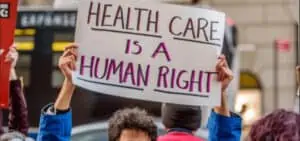ASAN April Newsletter
Dear friend,
Acceptance is an action! This month, we took action to make sure autism acceptance goes beyond April.
To mark Autism Acceptance Month 2022, ASAN released a statement on genetic research and autism. Written in plain language, this statement gives background information on autism research, lays out ASAN’s concerns about genetic research as applied to autism, and recommends safeguards to make sure that any genetic research on autism is done by and for the autistic community.
We also released comments for the April Interagency Autism Coordinating Committee (IACC) meeting. The IACC advises on federal funding for autism research. We used our comments to reaffirm our opposition to a suggested diagnostic label of “profound autism.” Attempts to split autism into multiple diagnoses will not improve services for autistic people, and are largely based on the desire to segregate autistic people with the most significant cognitive disabilities and support needs. Because of your efforts, IACC received many, many important comments about what kinds of research the autistic community wants to see! Thank you for advocating for research that matters to our community
We are proud to support the Health Equity and Accountability Act (HEAA), a comprehensive and strategic legislative roadmap that aims to eliminate racial and ethnic health inequities. HEAA is the only legislation that directly addresses the intersection of health inequities with race and ethnicity. HEAA will address social determinants of health and environmental justice issues that impact health.
There were many policy opportunities this month to take a stand with and for disabled immigrants. We submitted comments, and signed on to two additional letters, about changing the “public charge” rule. This proposal is critical to ensuring that immigrants who qualify for safety net programs can seek health care, food and nutrition assistance, housing or other help without putting future immigration applications at risk. We also joined a letter urging Congress not to tie COVID relief funding to Title 42. Title 42 is a racist, anti-immigrant policy that needlessly connects health to immigration status.
We’ve continued to release accessible resources about things that affect our community, like COVID-19. COVID-19 keeps changing, but one thing that remains the same is the need for accessible information about what we can do to keep safe. This is why we made three new accessible resources all about masks, why some vaccines need a second shot, and how the virus keeps changing! All resources are available in English and Spanish with accompanying videos.
We also released the first in a video series to go with our Racial Disparities in Community Living toolkit. The videos talk about racial disparities in emergency management, explores how policy choices, now and in the past, keep disabled people of color from accessing community living in emergency management. The videos also talk about what we can do to fix these problems. You can watch these videos part by part, or watch them all at once!
All too often, people with disabilities are told we aren’t worth investing in—but we know that our community deserves the supports and services we need to live safely in our communities. Home- and community-based services (HCBS) funding has a direct impact on the disability community throughout the entire country—the Senate must not negotiate away this critical investment! If you’ve ever thought about reaching out to your Senators about HCBS, this is the moment to do so. Our new guide walks you through meeting with your Senators’ staff one-on-one even if you can’t visit their office. A virtual hill meeting is an incredibly effective way to get your voice heard.
With heavy hearts, we want to take a moment to remember Teighlor McGee, who we lost this month to ongoing health concerns that were unaddressed by an ableist health care system. Teighlor leaves behind a legacy of radical care and advocating for all members of their community, especially the most marginalized. Please keep fighting to make the world a better place, just like Teighlor did – we will too, in remembrance of Teighlor and all those we’ve lost.
With gratitude,
The Team at ASAN
This month, the ASAN policy team:
|






